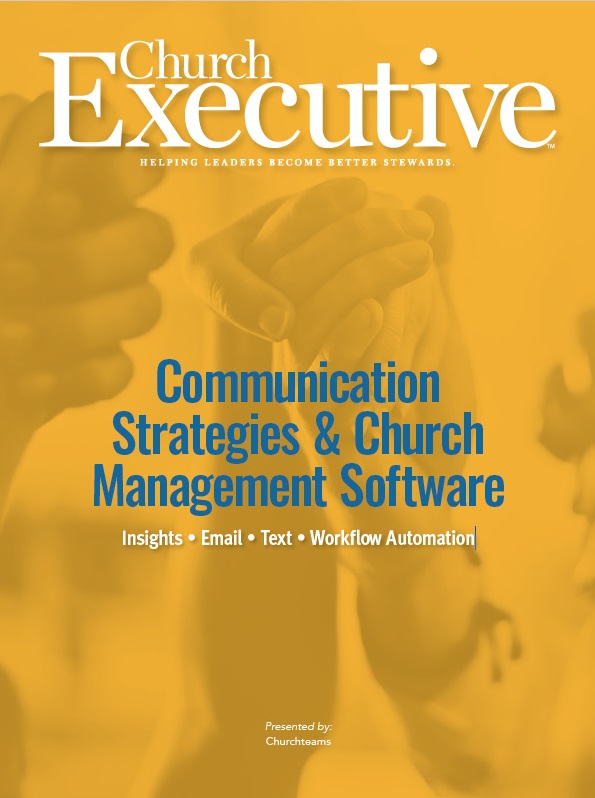
By RaeAnn Slaybaugh
 When it comes to texting, The Church of Grace and Peace has it down.
When it comes to texting, The Church of Grace and Peace has it down.
Here, Business Administrator Josette Kluender talks about all the different ways this easy, effective communications tool makes her whole team’s lives easier.

Business Administrator
The Church of Grace and Peace
(Toms River, NJ)
Church Executive: I understand that you discovered your church’s ideal ChMS provider at a pastor’s conference. Tell me more.
Josette Kluender: My husband, Tom — our Connections Pastor — and Senior Pastor Pastor Jim Wehrer attended the Renegade Pastors Conference in 2019. At the time, we had been using a different ChMS for more than 11 years and only used maybe one-quarter of its functionalities. Everyone was always looking to make changes to a database, which wasn’t a simple thing to do.
Both pastors told me they found this great company, there — Churchteams — and how affordable it was. Honestly, I thought, Well, how good could it be, then? How can it offer me everything that I need for such a small fee? Because I knew what we were paying, and it wasn’t inexpensive.
Luckily, Boyd [Pelley, co-founder of Churchteams] and his team were just amazing. They answered every question and even put us in touch with other, similar churches to ours. We got to communicate with all of them before we moved forward. This was critical because we really needed to get our database administrator, Shari Gilbert, onboard with potentially switching our ChMS.
When we did move databases, all of our pastors went into panic mode. I told them how easy it was: ‘If you use Facebook, you can use Churchteams. That’s how easy it is.’ Now they all use it, which just blows my mind. It’s just very, very easy.
CE: What did the training and implementation look like?
Kluender: Shari and I really dove into it. We met weekly with James [Seawell, Churchteams Director of Strategic Support] for two months, just to make sure that we were using it the right way. By the time it went live at our church, she and I were more than ready.
After that, we just needed to get the team ramped up on it. We were the first church where [Pelley] did on-site training, so that was awesome — to have the actual co-creator come out and teach us. He was here for two days training the pastors, ministry leaders and administration team.
CE: As you think about your church’s overall communication strategy, how important is texting?
Kluender: Well, texting is working great for us. It seems to be our main source of communication; not everybody wants to get a long email, but they’re very quick to open and read a text.
Texting has become one of the easiest, fastest ways for us to communicate with everybody.
CE: What unique advantages does texting offer, compared to other forms of reach-out — emailing, for instance?
Kluender: We’re able to text-to-give; people can either set up a recurring gift or automatically give as the pastor is praying over the offering. They can use that feature at any time.
We also use ‘text-to-check-in.’ Parents can just text the word ‘Check-in’ and skip the line for children’s church. Identification tags are waiting for their kids when they arrive. That’s a very, very awesome feature. We like that.
CE: What other functionalities were you looking for, specifically?
Kluender: The ChMS company we were prior to Churchteams offered texting, but only through a third-party; it wasn’t integrated with the database we were using. That meant we had to work with another company for all of our texting efforts.
So, one of the main things we were looking for was a single-source solution. Only a few ChMS providers offered this, including Churchteams. But a handful of other things put it at the top of the list.
First, it’s inexpensive.
Second, we liked Churchteams’ data and the metrics reporting. Our senior pastor likes to keep all of those statistics, so that’s very important to us.
Third, we really liked the ability to communicate with everyone within a specific group without having to pull a report first. For an example, we can create a group and assign a ministry leader to it. That ministry leader can communicate with each person in the group just by going to his or her group in Churchteams.

(Left to right) Josette Kluender; Bookkeeper Linda Pannasch; Administrative Assistants Kami Kaiser and Kim Van Nortwick
CE: What were some other important criteria?
Kluender: We use a lot of texting in our workflows. You set those up once and that’s it. If you do it properly the first time, they do everything for you from that point on, which is such a timesaver.
For example, we have a workflow to reassure parents that their children are being taken care of by screened, background-checked workers. All of that is done through a text message that happens less than 10 minutes after their children are taken to class.
Another good feature, for us, was registration through texting. People can just text a word, and that registers them into a certain meeting or event.

Another feature we use a lot is our membership application. Congregants receive a link to an application, which we used to provide on paper, and those applications are immediately funneled so pastors can approve them right away. This is much better than the old way of waiting for a paper application to be scanned in by an admin and then waiting for each pastor to approve or reject those by email. Now, everything happens within a day of a person hitting ‘complete’ on an online application.
But really, we didn’t even know we needed a lot of the functions in Churchteams until we started using them.
CE: What are some of the most effective ways your church uses the texting functionalities inherent to Churchteams?
Kluender: Right now, we send reminders every Sunday and Wednesday about our church services.
Every Sunday, we send out a mass text announcing a one-hour prayer call. The phone number and any other essential information is included, so nobody has to search for it.
We send ‘team huddle’ meeting reminders to all of our ministry leaders every week.
It’s just so quick because everybody has their phones in their hands. And like I said, they’re quicker to answer a text message than they are an email.
Plus, we can provide registration links in a text message.
CE: What’s the difference between free and 10-digit number texting?
Kluender: When we were in the beta program for Churchteams, all the texting was free. When that program ended and they began charging, it concerned us at first because of all the texting we were doing.
For a while, we used the free texting option — until it was explained to me that phone companies really don’t want you doing that. We needed to have five or seven different types of no-reply numbers, and it quickly became clear that people weren’t getting the text messages. I said, ‘Listen, we’re paying for it.’
It’s not an astronomical cost; if it adds $100 a month to our Churchteams invoice, that’s on the high side. And it’s worth every penny because people are getting the communication that they’re asking for.
CE: How does your church decide when and what to text?
Kluender: Anything that needs to go out churchwide gets a text message — all of our service times, anything with required attendance, and so on. Those go out three or four times per week.
Aside from that, group leaders can text on their own; we’ve given a lot of direct access to Churchteams so that they don’t have to rely on the admin staff. They’ve been trained by Shari on what they can do and how to do it. They take the initiative to manage their own groups.
I don’t know that we really have a limit on what we text, because it’s such an easy tool to use. Right now, we’re very lenient with it. I haven’t seen a reason to pull back and say, ‘OK, we’re texting too much.’
CE: Talk to me about the keywords functionality. How do you use it?
Kluender: We have some of our funds set up with keywords.
If a congregant texts the word ‘Give,’ it leads him or her to where they can give to our tithe or general fund.
If they text ‘Building,’ it goes to a building fund.
Texting ‘Youth’ designates that money for the youth ministry.
If they type the word ‘Food,’ it goes to our food pantry.
If they send ‘Pastors,’ it goes to our pastor’s love offering.
If they text ‘Toys,’ it goes right to our holiday toy drive for the underprivileged.
We also have 38 registration links that we can text, which people can use to register for certain events.
CE: What about workflow functions?
Kluender: We do workflows with our first-time guests, for example. Every time someone texts the word ‘First’ to us, they automatically go into a workflow that follows up. First, they get a text. Then they get an email from our pastor, talking about the message. Then they get a link to a survey that we ask them to fill out. Then they get another text message three days later. Then they get another email reminding them about the following week’s service.
We also use a workflow for anyone who’s accepted Christ: our Ministry of Helps application, which we talked about earlier. This turns into a workflow.
Rededication has its own workflow. So does outreach.
CE: And chat? Many people associate that function with a PC, not a phone.
Kluender: That’s a new feature. When you log into Churchteams, there’s a little bubble right next to your name, and it has a number in it. Whenever we text somebody, they can reply to our text messages via chat.
I have one here, actually: Sorry that I missed service. I got in late last night. I’m still needing the Word and hoping that God will help me make it there on Sunday. Now we can reply; we have a few people in the office who respond to those types of messages.
It’s an open line of communication.


